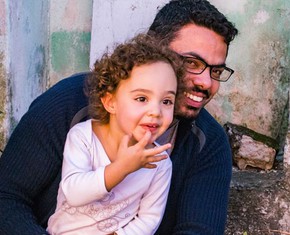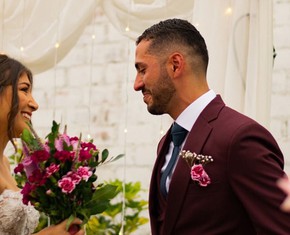The views expressed in our content reflect individual perspectives and do not represent the authoritative views of the Baha'i Faith.
Marriage—potentially one of the most rewarding and spiritually uplifting relationships we can have here on Earth—calls on all of us to find ways to create real harmony.
Unlike the bond between parent and child, marriage is the deliberate union of two who wish to be one, a union of choice as opposed to biology.
The Baha’i teachings attach great importance to the marital relationship, calling it “a fortress for well-being and salvation.” Marriage allows two independent people to converge, merge and coincide as we move through this life, thereby permitting us the peerless privilege of better knowing ourselves by intimately understanding our mate and building a family together.
The one who becomes our beloved is our traveling companion on the pathway of spiritual growth, the one we have chosen as our helpmate along the way. To ensure that the marriage remains harmonious and the fortress sound, we must recognize that during our marital union, we will travel many different and difficult paths, but we will travel together, hand in hand:
At all times hath union and association been well-pleasing in the sight of God, and separation and dissension abhorred. Hold fast unto that which God loveth and is His command unto you. He, verily, is the All-Knowing and the All-Seeing, and He is the All-Wise Ordainer. – Baha’u’llah, from a tablet translated from the Persian and Arabic.
The foundation of the Kingdom of God is based upon harmony and love, oneness, relationship and union, not upon differences, especially between husband and wife. – Abdu’l-Baha, Star of the West, Volume 6, p. 273.
The Baha’i teachings view this kind of marital harmony as forming “a single soul:”
The Lord, peerless is He, hath made woman and man to abide with each other in the closest companionship, and to be even as a single soul. They are two helpmates, two intimate friends, who should be concerned about the welfare of each other.
If they live thus, they will pass through this world with perfect contentment, bliss, and peace of heart, and become the object of divine grace and favor in the Kingdom of heaven. But if they do other than this, they will live out their lives in great bitterness …
Strive, then, to abide, heart and soul, with each other as two doves in the nest, for this is to be blessed in both worlds. – Abdu’l-Baha, Selections from the Writings of Abdu’l-Baha, p. 122.
Marriage can be anything we wish it to be, but in fact it has the potential to become even more than we can imagine. Marriage can be the place where we truly learn to love. It can be where we not only learn to love one another, but also where we learn to love the person reflected in our beloved’s eyes—ourselves. Marriage provides the opportunity to love the image that we see: the reflection of our spiritual being.
The life of a married couple should resemble the life of the angels in heaven—a life full of joy and spiritual delight, a life of unity and concord, a friendship both mental and physical … Their ideas and thoughts should be like the rays of the sun of truth and the radiance of the brilliant stars in the heavens. Even as two birds they should warble melodies upon the branches of the tree of fellowship and harmony. They should always be elated with joy and gladness and be a source of happiness to the hearts of others. They should set an example to their fellow-men, manifest a true and sincere love towards each other and educate their children in such a manner as to blazon the fame and glory of their family. – Abdu’l-Baha, from a tablet translated from the Persian.
The Baha’i teachings point out that in addition to the spiritual union in marriage, any truly harmonious marriage must be conditioned upon two very practical social agreements: the individuals’ mutual consent and attraction to one another and the subsequent approval of their union by their parents. To those of us who come from a society in which marriages are not arranged by parents, the concept of mutual consent of the couple may seem to be a non-issue. In like manner, to those of us who are accustomed to having parents choose spouses for their children, the consent of parents is a given. However, with the rising incidence of marriage between couples with diverse backgrounds, both kinds of consent are now practical and important to have. Regardless of the age of the couple and who arranges the marriage, the husband and wife must want to be together, and their union has a much greater chance of success when the parents approve and bless it. Both of these elements aid the couple—and the families involved—to bind with one another, help the marriage to endure, and build unity in the extended family by involving the parents:
The marriage of the Baha’is means that both man and woman must become spiritually and physically united, so that they may have eternal unity throughout all the divine worlds and improve the spiritual life of each other. This is Baha’i matrimony. – Abdu’l-Baha, Tablets of Abdu’l-Baha, Volume 2, p. 325.
















Comments
Sign in or create an account
Continue with Googleor